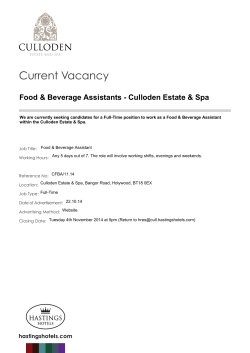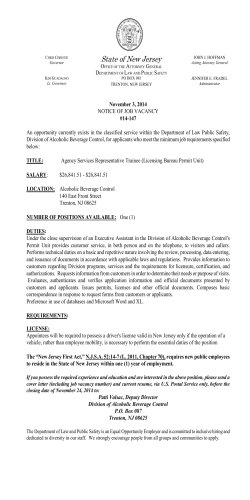
Recent activity in the food and beverage sector Autumn
Bite Size Recent activity in the food and beverage sector Autumn 2014 Welcome to the latest edition of ‘Bite Size’, our quarterly overview of activity in the food and beverage sector. This edition provides analysis of M&A activity in the third quarter (Q3) of 2014. In this issue we also provide insight into using strategic reviews to identify and act on underperforming assets. In addition we present a case study of Joe & Seph’s, the award-winning producer of gourmet popcorn, which is pursuing a successful growth strategy. We hope that you find this newsletter useful. If you have any further questions or queries, or would like to know how Grant Thornton can help you and your business please do not hesitate to contact me. Trefor Griffith Head of Food and Beverage, UK T +44 (0)20 7728 2537 E trefor.a.griffi[email protected] Identifying and acting on underperforming assets Strategic reviews can give management teams insight into how various divisions or subsidiaries can contribute – both strategically and financially - to the goals of the business. Where certain business operations no longer fit with the overall strategy and direction, rationalising a group’s portfolio by carving out and disposing of valuable non-core assets (as highlighted in the Spring 2014 edition of Bite Size) is a good way of realising value and has been well executed by a number of large players in the industry, including Unilever, Nestlé, GlaxoSmithKline and Premier. However, what options are available when underperforming (or, arguably, non-valuable) operations have been identified? These operations may or may not form an essential part of the strategic direction of the business but will most certainly absorb valuable resources such as cash and management time. It is important for businesses to identify an appropriate way to realise value in order to release these key resources and drive growth. We recently assisted a European bakery client in planning and implementing a systems and process overhaul to provide visibility on product and customer profitability. This work enabled our client to implement a factory rationalisation programme, dispose of non-core business operations and re-engineer key products and manufacturing. The resulting turnaround enabled the management team to drive strategic, operational and financial decision making from a stable and reliable base. Indeed, realising best value from an underperforming asset may not always result in a sale process, and a number of alternatives may also need to be considered, taking into account the relevant strategic and external factors impacting on the underperforming area of the business. These alternatives could include: • Turnaround • Integration • Closure • Controlled wind down Each of these options is not without its complications, and will require clear direction and leadership in order to minimise the disruption to the remainder of the business and ensure that there is no damage to the brand during what can be a difficult time, particularly if closure or wind down has been identified as the most appropriate route. We have extensive experience of working alongside management in challenging circumstances, where the most appropriate way of delivering value may not be readily apparent. In addition to the financial benefits, such as stemming losses, a focused strategy and a clear plan to deal with assets which are underperforming has also meant that our clients have found themselves more able to attract and retain competitive financing and with more time available to focus on growing other key areas of their business. For more detailed information or examples of how our clients have benefited from our approach, please contact: Adrian Richards Partner, Restructuring and Debt Advisory T +44 (0)20 7728 2001 E [email protected] Catherine Barnett Manager, Restructuring and Debt Advisory T +44 (0)20 7728 3278 E [email protected] Joe & Seph’s, award winning producer of gourmet popcorn, is pursuing a successful growth strategy, please refer to the back page for the story of their success to date. M&A activity – Q3 2014 Quarterly volume and value both decline Private equity activity well ahead of 2013 levels PE activity in Q3 2014 was 14% lower by volume than in the previous quarter, but on a positive note, was up 20% on the same time last year. Also, PE deal volume in the first three quarters of 2014 has already exceeded 2013’s full-year total by 32%. Within this PE transaction activity, the healthy eating theme was also evident. In August, Bridges Ventures acquired Wholebake, the Welsh cereal bar producer, which makes the 9 Bar brand from Finance Wales. Buying the healthy, seed-based snack bar maker was the private equity group’s first acquisition in the food sector. Earlier this year, Valeo Foods, the owner of the Jacobs biscuit brand, which is backed by Capvest, acquired Rowse Honey. In September it further reinforced its branded presence with the acquisition of health food specialist Kelkin and Robert Roberts, which is best known for its coffee brand, from energy-to-technologies conglomerate DCC, for a total consideration of £46.9 million. Other PE activity during the quarter includes, Pork Farms’ (which is backed by Vision Capital), acquisition of Kerry Foods’ chilled savoury pastry business for Announced M&A activity in food and beverage - quarterly 60 Number of deals Value of deals (£ million) 13000 12000 50 Number of deals 9000 40 8000 7000 30 6000 5000 20 4000 Value of deals (£ million) 11000 10000 3000 10 2000 1000 0 Q1 Q2 Q3 Q4 Q1 Q2 Q3 Q4 Q1 Q2 Q3 Q4 Q1 Q2 Q3 Q4 Q1 Q2 Q3 2010 2010 2010 2010 2011 2011 2011 2011 2012 2012 2012 2012 2013 2013 2013 2013 2014 2014 2014 0 NB: the spike in 2010 deal values is attributable to the Q1 acquisition of Cadbury by Kraft for £11.9 billion Announced PE activity in food and beverage - quarterly Number of deals Value of deals (£ million) 2,000 1,800 12 1,600 10 1,400 1,200 8 1,000 6 800 600 4 Value of deals (£ million) 14 Number of deals Following the second quarter’s surge, total disclosed deal value decreased by 30% in Q3 2014 compared with the previous threemonth period and by 25% compared with the third quarter last year[1]. Deal volumes also declined, dropping by 26% compared with Q2 2014 and by 10% relative to the same period a year ago. However, year-to-date total volume of 106 deals is slightly ahead of the 104 deals recorded in the first three quarters of 2013. Wholesale and distribution was the most active sub-sector, accounting for 22% of deal volume, up from 17% in Q2 and 16% in Q1. On a positive note, the number of deals involving distressed companies continued the steady decline evident since Q4 2013[2]. However, fewer of these companies were acquired from administration - just 17% compared with the 44% of the previous quarter. This may reflect a reduction in the pressure being applied by the banks on under-performing businesses. A number of recurrent themes were represented in this quarter’s activity: the prominence of private equity; buyers’ ongoing interest in targets in the healthy eating and nutrition sub-sectors; and the two-way flow in overseas transactions – with interest in foreign assets by UK-based entities as well as interest from overseas buyers in UK businesses. 400 2 200 0 Q1 Q2 Q3 Q4 Q1 Q2 Q3 Q4 Q1 Q2 Q3 Q4 Q1 Q2 Q3 Q4 Q1 Q2 Q3 Q4 Q1 Q2 Q3 Q4 Q1 Q2 Q3 Q4 Q1 Q2 Q3 07 07 07 07 08 08 08 08 09 09 09 09 10 10 10 10 11 11 11 11 12 12 12 12 13 13 13 13 14 14 14 Nothing new under the sun? Innovation is an expensive process and, according to a new study by the European Commission, food companies are doing less of it. The report was commissioned following complaints by food producers that they were discouraged from investing in new product development because of the requirements being placed on them by retailers. The study looked at changes in the European Union retail food market over the past decade and found that the number of new innovations reaching consumers had fallen by 6.5% since 2008. Also, whereas ten years ago the vast majority of innovations were either completely new products or extensions to existing ranges, in 2012 one third of innovations were related to product packaging. The study concluded that the decline in the rate of innovation was because suppliers had reduced their expenditure on R&D, but also because the fast growing discount retailers are carrying a narrower range of products. Nonetheless, the report found that consumer choice in the EU had increased, with the opening of new stores leading competitors to offer greater choice and innovation. The pressure to innovate remains, but given the expense of developing new products in-house, we expect many companies will look to buy innovations through M&A activity. 0 an undisclosed amount. Succinctly summing up the pressure facing food producers, Pork Farms said the deal would create a more streamlined, more responsive and better invested supply chain, reflecting the increasingly competitive retail landscape as consumers’ shopping habits change. Looking overseas for healthy targets The nutrition and healthy eating theme also underpinned two of the quarter’s deals by UK-based companies to acquire overseas assets. UK-based consumer goods group PZ Cussons has been expanding into the food sector. Cussons’ food portfolio includes Greek olive oil and spreads brand Minerva and last year the company bought Australian baby food business Rafferty’s Garden. During the third quarter Cussons made a further Australian acquisition, buying leading organic yoghurt brand Five:am. Deals summary – Q3 2014 Irish sports nutrition and ingredients company Glanbia completed its £94.1 million acquisition of the US protein shakes maker Isopure. Glanbia started selling protein shakes straight to consumers with the 2008 acquisition of Optimum Nutrition, having previously sold its ingredients to drinksmakers. Adding Isopure, which focuses on powders and ready-to-drink formats, adds a business that has grown at a compound annual rate of 20% since December 2011. Large deals with disclosed values (>£250m deal value) [3] Sector Meat, Fish & Poultry Target Acquirer Sep-14 Cermaq ASA (Norway) MC Ocean Holdings (subsidiary of Misubishi) Deal value (£ million) 856.3 Mid market deals with disclosed values (£50 million - £250 million deal value) Date Target Acquirer Deal value (£ million) Functional Sep-14 Isopure Company LLC Glanbia plc 94.1 Dairy Aug-14 Five AM Life Pty PZ Cussons plc 51.8 Wholesale and Distribution Aug-14 PCL 24/7 Ltd and Gruppo Dac SpA The Bidvest Group 95.0 Sector Securing the supply chain Also of note, in September, tea producer James Finlay acquired Casa Fuentes SACIFI, the largest tea estate company in Argentina for an undisclosed sum to secure supplies of sustainable tea. Securing the supply chain was part of the rationale for third quarter deals by the UK subsidiaries of the large Japanese trading companies – Marubeni and Mitsubishi – as they move to reinforce their geographic presence outside Japan. Through its UK subsidiary MC Ocean Holdings, Mitsubishi, which aims to double its earnings from non-resource assets by 2020, acquired Norwegian fish farmer Cermaq for £856.3 million, making it the world’s secondbiggest salmon farmer. Marubeni, through its MBC Europe subsidiary also strengthened its supply chain with the acquisition of Brazilian coffee manufacturer Companhia Iguacu de Cafe Soluvel. We expect to see continued activity from such companies in the coming months as they look to diversify their interests outside of the Far East. In terms of inward cross border deal activity, South African buyers were prominent in the third quarter. Bidvest, a South Africa-based trading, distribution and foodservice company acquired PCL 24/7, a UK-based chilled distribution and storage business, as well as Italian foodservice company Gruppo Dac, for an aggregate consideration of approximately £95 million. In August, South Africa’s Spar Group bought an 80% stake in Ireland’s BWG Group, which owns Spar in Ireland and the southwest of England for £43.9 million. Date Small deals with disclosed values (<£50 million deal value) Sector Acquirer Deal value (£ million) Date Target Soft Drinks / Functional Sep-14 Robert Roberts and Kelkin Valeo Foods 46.9 Dry Grocery Sep-14 Mary Berry and Daughters RH Amar 2.5 Soft Drinks Sep-14 Companhia Iguacu de Cafe Soluvel MBC Europe (Marubeni) 24.0 Wholesale and Distribution Aug-14 Enterprise Foods MBO backed by Hattington Capital 30.0 Wholesale and Distribution Aug-14 BWG Group* The Spar Group (South Africa) 43.9 Dairy Jul-14 FoodTec UK Adams Food Ingredients 1.2 * The Spar Group is to take an 80% stake in BWG Group Key undisclosed deals Sector Deal value (£ million) Date Target Acquirer Alcoholic Drinks Sep-14 The Drambuie Liqueur Company William Grant & Sons ND Dry Grocery Sep-14 European Oat Millers David and Bill Jordan* ND Soft Drinks Sep-14 Casa Fuentes SACIFI SA James Finlay ND Deli Aug-14 Kerry Foods Ltd's chilled savoury pastry assets Pork Farms ND Catering Aug-14 Searcy's Westbury Street Holdings (WSH) ND Confectionery Aug-14 House of Dorchester Charbonnel et Walker ND Wholesale and Distribution Aug-14 BFP Wholesale ZIMT Holding ND Bakery Jul-14 Wholebake Bridges Ventures ND * acquired the remaining 50% not already owned Notes [1] All deal activity is based on announced date of the deal and includes deals where there has been any UK or Ireland involvement (target or acquirer). Administrations, liquidations and receiverships are collated but not counted as M&A unless they have subsequently been acquired. [2] Business failure data includes administrations, receiverships and liquidations. For the purposes of collating failure statistics, all ‘failures’ are counted irrespective of whether they were subsequently acquired. Only business failures announced in the press are included in the count for years 2007-2011. For 2012 onwards London Gazette data is also included. [3] Deal values are primarily sourced from corporate websites, however if no press release is available they are sourced from deal database BvD Zephyr or from press commentary released at the time of the deal. Deal values may subsequently be amended pending earn outs or other finance arrangements or/and as further detail is released by the acquirer. Sources: All deal data is gathered as it takes place from numerous sources including trade press, BvD Zephyr and ThomsonReuters. L Case study: Joe & Seph’s Popcorn Joe & Seph’s Gourmet Popcorn recently won the FDF Growth Business Award, part of the FDF Awards 2014, which was proudly sponsored by Grant Thornton UK LLP for a second year running. Read their success story below: Joe & Seph’s Gourmet Popcorn produces over 40 innovative flavours of popcorn from production kitchens in North London, supplying outlets including Selfridges, Ocado, Picturehouse Cinemas, Waitrose, Claridges Hotel and stores internationally. Joe and Seph’s flavours have won 15 Great Taste Awards, the Best Food & Drink Producer in the Southeast 2013 Award, Insider Made in the UK Best food producer and have received rave reviews from press and Michelin Star Chefs alike. The company’s growth strategy is centered on supplying great tasting popcorn to a variety of premium channels, utilising the four pack formats (Snack Packs, Standard Pouches, Bulk Catering Packs and Gifts), with a target of doubling turnover in 2014. The opportunity for growth is large as distribution of popcorn is increasing in all channels in the UK as well as in the 15 countries the company supplies across the world. Innovation is also at the heart of the business. The company recently launched the world’s first cocktail popcorn, made with 5% real spirit and which comes in a range of spirits that includes Mojito, Margarita and Cosmopolitan popcorns. Production and packing capacity is even being doubled to cope with growth. Key to the growth success are a sustainable business plan and growth in the product range – Joe & Seph’s was launched with just five flavours and has now grown to 40, catering to different tastes across the different customers supplied. king forward The recent fall in crude oil prices, which is filtering down to pump prices at petrol stations, is a welcome relief for motorists. However, it is also another illustration of the ongoing price war between UK supermarket chains. Cheap petrol is one way of driving footfall and in mid-October Tesco, Asda and Sainsbury’s all reduced forecourt fuel prices. As we have previously highlighted, this continuing intensification in competition in the UK grocery market is a structural rather than a cyclical phenomenon. Tesco’s recent financial problems are indicative of the very difficult market environment that supermarket retailers are facing and will continue to face. It is difficult to forecast what the UK retail landscape will look like in five year’s time, but it is unlikely to be an environment that is favourable for food and beverage suppliers. As a result, sentiment about the outlook within the sector is broadly negative. However, from a deal perspective, the tough environment is The company’s interaction with customers and its approach to marketing have helped build a strong brand and loyal fan base. With no budget for marketing, growth has been achieved instead using a mixture of free PR, social media and by attending consumer food shows to build the brand. The Joe & Seph’s brand was built from scratch and business growth has been achieved organically without any external funding. Starting out as a family business with three employees - husband (Joseph), wife (Jackie) and son (Adam), turnover has more than doubled every year and the team has grown significantly, and now stands at 23 people. “Congratulations to Joe and Seph’s for winning the FDF Growth Business award, a real testament to the successful growth of the company over the last few years. Food and beverage is a focus sector for Grant Thornton both in the UK and globally likely to promote transaction activity. Compared with the drinks industry, the UK food sector remains fragmented and consolidation will continue to be an important investment theme driving deals. Acquiring rivals to take costs out – and in some cases manufacturing overcapacity – is an important part of companies’ efforts to maintain or achieve the scale and competitive advantage needed to sell to the large multiple retailers. Finsbury Food Group’s recent acquisition of Fletchers Group, for example, almost doubles the company’s sales and makes it one of the largest specialty bakers in the UK. At the same time, food and beverage companies are likely to remain focused on the growth segments within the sector. Deals underpinned by the desire to expand into the healthy eating and well-being markets will continue to be another important investment theme in food and beverage. and we were proud to sponsor this award for a second year running as we’re committed to helping dynamic businesses grow. The food and drink industry is continuing to grow, which has been clearly highlighted and demonstrated exceptionally by all the companies that were shortlisted for this award,” said Trefor Griffith, Head of Food and Beverage Grant Thornton UK LLP. Trefor Griffith Head of Food and Beverage T +44 (0)20 7728 2537 E trefor.a.griffi[email protected] Tracey Jarvis Research Manager Food and Beverage T +44 (0)20 7728 3275 E [email protected] © 2014 Grant Thornton UK LLP. All rights reserved. ‘Grant Thornton’ refers to the brand under which the Grant Thornton member firms provide assurance, tax and advisory services to their clients and/or refers to one or more member firms, as the context requires. Grant Thornton UK LLP is a member firm of Grant Thornton International Ltd (GTIL). GTIL and the member firms are not a worldwide partnership. GTIL and each member firm is a separate legal entity. Services are delivered by the member firms. GTIL does not provide services to clients. GTIL and its member firms are not agents of, and do not obligate, one another and are not liable for one another’s acts or omissions. This publication has been prepared only as a guide. No responsibility can be accepted by us for loss occasioned to any person acting or refraining from acting as a result of any material in this publication. grant-thornton.co.uk BiteSizeAutumn2014 V24591
© Copyright 2026










